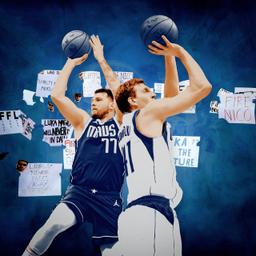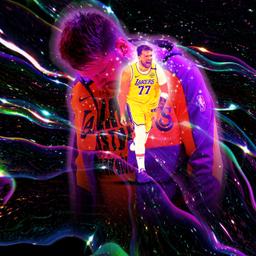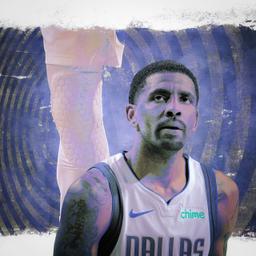For a certain kind of all-time hooper, it ain’t just the feats but the slights that are key to their psyche. His Airness was, among other things, a maestro at staying insulted, the spiteful master of a universe of offenses that he could take “personally.” Kobe spent the better part of two decades torturing George Karl, one iso-fadeaway at a time, after the coach dared to bench him in the fourth quarter of an All-Star Game at age 19. Even LeBron channeled a Finals loss and a summer’s worth of J.J. Barea jokes into an Olajuwon-approved post package. When it comes to NBA superstardom, every flame is different; what they share is a spark. There are many ways to forge an on-court empire but none more affiliated with the peak of the basketball food chain than balling out as vengeance.
Luka Doncic, the latest great to be gifted to the Lakers, is next up with a dose of get-back on his mind. One of the most hyped talents ever to cross the Atlantic, Doncic was booted from Dallas around midnight on February 2 by Mavericks general manager and heel Nico Harrison and a guy whose mother-in-law bought him the squad. This betrayal and the subsequent trickle of anonymous, management-sourced professional besmirching had a predictable effect on the 26-year-old Slovenian prodigy. Doncic looked, for a period, like he wanted to crawl under a rock. He cycled through all five stages of grief in public. Off-court, he appeared exhausted, eyes wandering, emotionally shaken.
In the eight weeks since he debuted in L.A., Luka’s production has trended mostly upward, though his offensive efficiency and stamina on defense both continue to lag. His bark, though, is back and booming. In a March 16 contest against the imploding Phoenix Suns, Doncic’s relentless chirping prompted LeBron to giggle from the bench. (The Lakers won; Doncic scored 33.) A few days later, in a win against the Denver Nuggets, Luka responded to opposing forward Peyton Watson’s attempt at trash talk by cordially inviting him to “shut the fuck up.” When a Denver fan tried heckling Doncic at the free throw line in the first quarter, the guard responded, to everyone in particular, “I got 20, you talkin’ about ball don’t lie.”
For those of us who study the ripples of Doncic’s every motion, there is a tendency to interpret these exchanges as conquering omens. Time will tell. Starting with his return to Dallas on Wednesday, the sport will begin to see how much influence the most extraordinary slight of an era will have upon the finished text of his career. Pushed to the brink before, Doncic has been able to do almost anything: outpass, outshoot, plain outthink you to oblivion. So it stands to reason that if he wants it enough, he’ll get his retribution. Tune in for a glimpse.
Behold how pissed the man truly is.
In early March, just a few weeks after the trade, I watched Doncic play against the Celtics at TD Garden, in front of a Boston crowd that’d already begun selling “Luka Sucks” tees out on Causeway Street. His performance was on-brand: sluggish at first, outwardly exasperated, often magnetic, and more than occasionally astounding. About six minutes into the game, he tossed a no-look pass behind his hip that might as well have hopped, of its own volition, straight from the man’s right pocket. As in last year’s Finals, Celtics wing Jaylen Brown spent most of the matchup pestering Luka’s dribble, getting underneath him, cutting off his angles to the hoop. It worked until halftime, and then something clicked for Doncic. He started toying with his defender’s cadence, slowing himself mid-drive, elevating only to suddenly decelerate and clear his airspace just enough to put the ball in the hoop or launch it gently into a teammate’s hands, no matter where they were on the court.
When Doncic is engaged offensively, it is a sight to behold. Back when he was a teenager playing for Real Madrid, the fans called him “El Matador,” a fair title for one who courts disaster so elegantly. He’s long wielded a head-fake array that makes defenders turn around and wonder where the ball has gone. Doncic can breach any double-team with a pinpoint overhead pass. He’s strong enough to bounce all incoming traffic off his hip in the paint but nimble enough, still, to contort himself to the rim at will, despite a weight and conditioning level that give off the vibes of a guy who might open a pack of cigs on the sideline. His two-handed grip on layups effectively negates any attempts to poke the ball out. He creates passing windows from thin air, batters defenders from the post, pivots and Euro-steps in and out of shadow realms, and is in range of a pull-up the moment he crosses half court. Luka has never had top-level speed and never needed it: His breaks—the control he holds over his own longitudinal movement—are unparalleled, as is his ability as a ball handler. He’s single-mindedly devoted to exploiting advantages in skill or size, ruthlessly so.
He’ll holler at you while he proves it. No shame involved in his game. That’s partially distinct to him as a showman: personal if not always comprehensible. “When you go to the court, you just change,” he told Slam magazine back before he was drafted. “You’re a different person.” Away from polished hardwood, Luka’s a wallflower; on a stage, he blooms. No matter the moment, no matter how harsh or how petty, he can’t help but get lost in it, shrink it down, meet it eye to eye. His momma, Mirjam, has watched this dynamic for Luka’s whole life: “He’s here. He doesn’t think about the next game. He’s thinking about the game today.”
This is another way of saying that the brother has always got time. From a certain angle, there’s a sliver of that attitude that stems from Doncic’s origins. Stunt your way out of Slovenia, a Balkan dot slightly larger than New Jersey, and you’re bound to be a scrapper, one way or another. For Luka, in effect, it’s a habit that’s proved fortuitous between the lines. All of his greatest professional triumphs—swaggering “Everybody acting tough when they up” to the Phoenix Suns before burying them in 2022; putting the Timberwolves to bed last year and screaming “Go home bitch” courtside—involve Doncic leaning into the moment and using conflict to meet it.
Sometimes, this backfires. He’s been known to get lost in typhoons of resentment. He’ll audit and interpret the officiating against him to the point of obsession. When he believes he’s been wronged, he’s a notorious loafer on defense. Almost every deficiency in Doncic’s game, at least mentally, is fused to the outlook that sets him apart. And yet, paradoxically, it’s this dynamic that often most endears him to his fans, his peers, anyone without an opposing rooting interest in eyesight.
He’s a little grimy. Rough around the edges. He drinks a beer postgame, smokes hookah, has a forearm-length tattoo of a Siberian tiger, and took to driving Porsches the very first moment he got enough money (and the legal right) to do so. We know him, even though we don’t.
He’s the kid who talks back to the teacher and gets kicked out of class. Catch him on the right day—or the wrong one, depending on your perspective—and he’s not above questioning an opponent’s manhood live on television. Dude curses. Sometimes tears his jersey in half. Frequently calls the top 1 percent of tall people on earth too “fuckin’ small” to guard him. It colors him. The magic inherent to the Luka Doncic experience is, and has always been, the fact that there’s no trickery involved.
He is who he is. He’s never above it. More often than not, he doesn’t need to be.
How he channels that attitude, in the wake of the biggest embarrassment of his public life, is what’ll shape his immediate future and his wider basketball legacy. The only team and home he’s ever known stateside just ditched him—just months after he led them to an unexpected Finals appearance—and called him a heavyset, pilsner-drinking imp on the way out. Can taking it “personally” mean shedding 20 pounds? Regaining some semblance of verticality? Maxing out his dearth of lateral mobility to at least hit a functional level of performance within a team defense?
If Luka wields what went down in February like he’s been known to wield far less, he’ll hit his peak. Doubly so if he manages to crib whatever mental and physical lessons he can from LeBron, a childhood idol who’s found a way to match and exceed his own “chosen one” expectations for 20-plus years. In the long run, that’d mean jewelry. And if Luka peaks with a championship, however imperfectly, in L.A., he’ll be a god. Not in spite of those edges that needed sanding down but because of them. The clock is ticking. An answer might come on a Wednesday night in April, or a series in late spring, or a training camp in October with a new physique in tow. Let history tell it: There’s plenty of get-back to get for hoopers disinclined to pass that kind of thing up.



